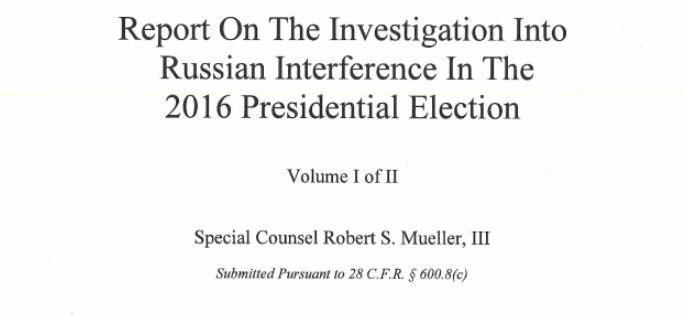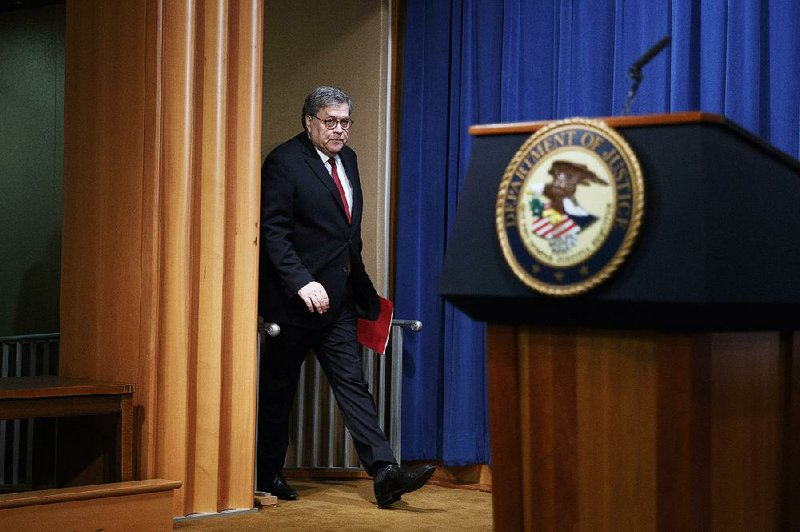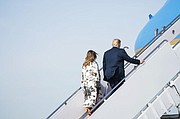WASHINGTON -- The long-awaited report from special counsel Robert Mueller details President Donald Trump's conduct throughout the investigation -- finding 10 episodes of suspicious behavior -- but ultimately concludes that it was not Mueller's role to determine whether the commander in chief broke the law.
"The evidence we obtained about the President's actions and intent presents difficult issues that would need to be resolved if we were making a traditional prosecutorial judgment," Mueller's team stated in the report released Thursday to Congress. "At the same time, if we had confidence after a thorough investigation of the facts that the President clearly did not commit obstruction of justice, we would so state. Based on the facts and the applicable legal standards, we are unable to reach that judgment."
Since Mueller ended his nearly two-year investigation last month, a central question facing the Justice Department has been why Mueller's team did not reach a conclusion about whether the president obstructed justice.
The issue, the nearly 450-page report said, was complicated by two key factors -- the fact that, under department practice, a sitting president cannot be charged with a crime, and that a president has a great deal of constitutional authority to give orders to other government employees.
Trump submitted written answers to investigators. The special counsel's office considered them "inadequate" but did not press for an interview with him because doing so would cause a "substantial delay," the report said.

Click here to read the redacted Mueller report, or click here to download a PDF of the 448-page document.
FULL COVERAGE:
∙ Mueller's report finally public
∙ Push on in '16 for Clinton emails
∙Arkansas GOP delegation applauds release
∙ Report notes Sanders' Comey claims as false
∙ Probe examined 10 actions on obstruction of justice
The report said investigators felt that they had "sufficient evidence to understand relevant events and to make certain assessments without the President's testimony."
While the report marked the end of Mueller's work, his investigation has already produced criminal charges against 34 people, including six former Trump associates and advisers. Multiple related investigations involving the president are ongoing.
Trump's legal team called Mueller's report "a total victory" for the president.
"The report underscores what we have argued from the very beginning -- there was no collusion -- there was no obstruction," they said.
But Democrats cried foul over Attorney General William Barr's decision to hold a news conference Thursday morning before releasing the report and said the report revealed troubling details about Trump's conduct in the White House.
In a joint statement, House Speaker Nancy Pelosi and Senate Democratic leader Charles Schumer wrote that "one thing is clear: Attorney General Barr presented a conclusion that the president did not obstruct justice while Mueller's report appears to undercut that finding."
House Judiciary Chairman Jerrold Nadler added that the report "outlines disturbing evidence that President Trump engaged in obstruction of justice and other misconduct."
Trump's lawyers, in their statement, criticized former leaders at the FBI for opening "a biased, political attack against the President -- turning one of our foundational legal standards on its head."
The report described one meeting in which the president complained about then-Attorney General Jeff Sessions' decision to recuse himself from the Russia investigation. Trump insisted that past attorneys general had been more obedient to their presidents, referring to the Kennedy brothers and the Obama administration, the report said.
"You're telling me that Bobby and Jack didn't talk about investigations? Or Obama didn't tell Eric Holder who to investigate?" Trump told senior White House staff members Steve Bannon and Don McGahn, according to the report.
"Bannon recalled that the President was as mad as Bannon had ever seen him and that he screamed at McGahn about how weak Sessions was," the report said.
Repeatedly, it appears Trump may have been saved from more serious legal jeopardy because his own staff members refused to carry out orders they thought were problematic or potentially illegal.
For instance, in the early days of the administration, when the president was facing growing questions concerning then-national security adviser Michael Flynn's conversation about sanctions with a Russian ambassador, the president ordered another aide, KT McFarland, to write an email saying the president did not direct those conversations. She decided not to do so, unsure if that was true and fearing it might be improper, the report said.
"Some evidence suggests that the President knew about the existence and content of Flynn's calls when they occurred, but the evidence is inconclusive and could not be relied upon to establish the President's knowledge,'" the report said.
The report also recounts a moment in May 2017 when Sessions told Trump that Mueller had just been appointed special counsel. Trump slumped back in his chair, according to notes from Jody Hunt, Sessions' then-chief of staff. "Oh my God, this is terrible. This is the end of my presidency," Trump said. Trump further laid into Sessions for his recusal, saying Sessions had let him down.
"Everyone tells me if you get one of these independent counsels it ruins your presidency," Trump said, according to Hunt's notes. "It takes years and years and I won't be able to do anything. This is the worst thing that ever happened to me."
After the report was released, Trump pronounced it "a good day" and tweeted "Game Over" in a typeface mimicking the Game of Thrones logo.
From Air Force One on his way to Mar-a-Lago on Thursday, he tweeted: "I had the right to end the whole Witch Hunt if I wanted. I could have fired everyone, including Mueller, if I wanted. I chose not to. I had the RIGHT to use Executive Privilege. I didn't!"
Top Republicans in Congress saw vindication, too.
House Minority Leader Kevin McCarthy said it was time to move on from Democrats' effort to "vilify a political opponent." The California lawmaker said the report failed to deliver the "imaginary evidence" incriminating Trump that Democrats had sought.
Trump campaign manager Brad Parscale said Republicans should turn the tables and "investigate the liars who instigated this sham investigation."
THE RUSSIA FACTOR
The special counsel's report on possible coordination between the Trump campaign and Russians to interfere in the 2016 election is detailed, with only modest redactions, and reveals new details about interactions between Russians and Trump associates.
Mueller's team wrote that though the investigation "did not establish that the Trump Campaign coordinated with the Russian government in its election interference activities," that assertion was informed by the fact that coordination requires more than two parties "taking actions that were informed by or responsive to the other's actions or interests."
And Mueller made it clear that Russia wanted to help the Trump campaign, and the Trump campaign was willing to take it.
"Although the investigation established that the Russian government perceived it would benefit from a Trump presidency and worked to secure that outcome, and that the Campaign expected it would benefit electorally from information stolen and released through Russian efforts, the investigation did not establish that members of the Trump Campaign conspired or coordinated with the Russian government in its election interference activities," Mueller's team wrote.
The report detailed a timeline of contacts between the Trump campaign and those with Russian ties -- much of it already known, but some of it new.
For example, Mueller's team asserted that in August 2016, Konstantin Kilimnik, whom the FBI has assessed as having ties to Russian intelligence, met with Paul Manafort, Trump's campaign chairman, "to deliver in person a peace plan for Ukraine that Manafort acknowledged to the Special Counsel's Office was a 'backdoor' way for Russia to control part of eastern Ukraine."
The special counsel wrote that both men believed the plan would require candidate Trump's "assent to success [were he elected President]."
"They also discussed the status of the Trump Campaign and Manafort's strategy for winning Democratic votes in Midwestern states," the special counsel wrote. "Months before that meeting, Manafort had caused internal polling data to be shared with Kilimnik, and the sharing continued for some period of time after their August meeting."
Mueller's report suggests his obstruction of justice investigation was heavily informed by an opinion from the Justice Department's Office of Legal Counsel that says a sitting president cannot be indicted -- a conclusion Mueller's team accepted.
"And apart from [Office of Legal Counsel's] constitutional view, we recognized that a federal criminal accusation against a sitting President would place burdens on the President's capacity to govern and potentially preempt constitutional processes for addressing presidential misconduct," Mueller's team wrote.
The team wrote that it "determined not to apply an approach that could potentially result in a judgment that the President committed crimes." The team seemed to shy from producing even an internal document that alleged the president had done something wrong -- deciding, essentially, that the team wouldn't decide.
"Although a prosecutor's internal report would not represent a formal public accusation akin to an indictment, the possibility of the report's public disclosure and the absence of a neutral adjudicatory forum to review its findings counseled against determining 'that the person's conduct constitutes a federal offense.'"
Barr said during a news conference Thursday that Justice Department officials asked Mueller "about the [Office of Legal Counsel] opinion and whether or not he was taking the position that he would have found a crime but for the existence of the [Office of Legal Counsel] opinion."
"He made it very clear, several times, that he was not taking a position -- he was not saying but for the [Office of Legal Counsel] opinion he would have found a crime," Barr said.
Mueller did not attend the news conference with Barr.
Barr addressed the media before releasing the nearly 400-page report. He made repeated references to "collusion," echoing language the president has stressed even though it is not a legal term.
Barr also described how the nation's top law enforcement officials wrestled with investigating Trump for possible obstruction of justice. He and Deputy Attorney General Rod Rosenstein "disagreed with some of the special counsel's legal theories and felt that some of the episodes did not amount to obstruction as a matter of law" but that they accepted the special counsel's "legal framework" as they analyzed the case, Barr said.
It was the first official acknowledgment of differing views inside the Justice Department about how to investigate the president.
Barr also spoke about the president's state of mind as Trump responded to the unfolding investigation. "As the Special Counsel's report acknowledges, there is substantial evidence to show that the president was frustrated and angered by a sincere belief that the investigation was undermining his presidency, propelled by his political opponents, and fueled by illegal leaks," he said.
In a letter, Pelosi and Schumer said they wanted testimony "as soon as possible" from Mueller. And after Barr's news conference, Nadler released a letter to the special counsel seeking Mueller's appearance before his panel "no later than May 23."
Congressional Democrats have vowed to fight to get the entire report, without redactions, as well as the underlying investigative documents Mueller gathered.
The report has been the subject of heated debate since Barr notified Congress last month that Mueller had completed his work. Soon after, Barr released a summary of the findings, but not the entire report.
Barr told lawmakers that he needed time to redact sensitive information before it could be made public, including any grand jury material as well as details whose public release could harm ongoing investigations.
Barr also said he would review the document to redact information that would "potentially compromise sources and methods" in intelligence collection and anything that would "unduly infringe on the personal privacy and reputational interests of peripheral third parties."
Information for this article was contributed by Devlin Barrett, Matt Zapotosky, Philip Rucker, John Wagner and Felicia Sonmez of The Washington Post; and by Nancy Benac, Chad Day, Eric Tucker, Michael Balsamo, Jonathan Lemire, Jill Colvin and Darlene Superville of The Associated Press.
A Section on 04/19/2019


